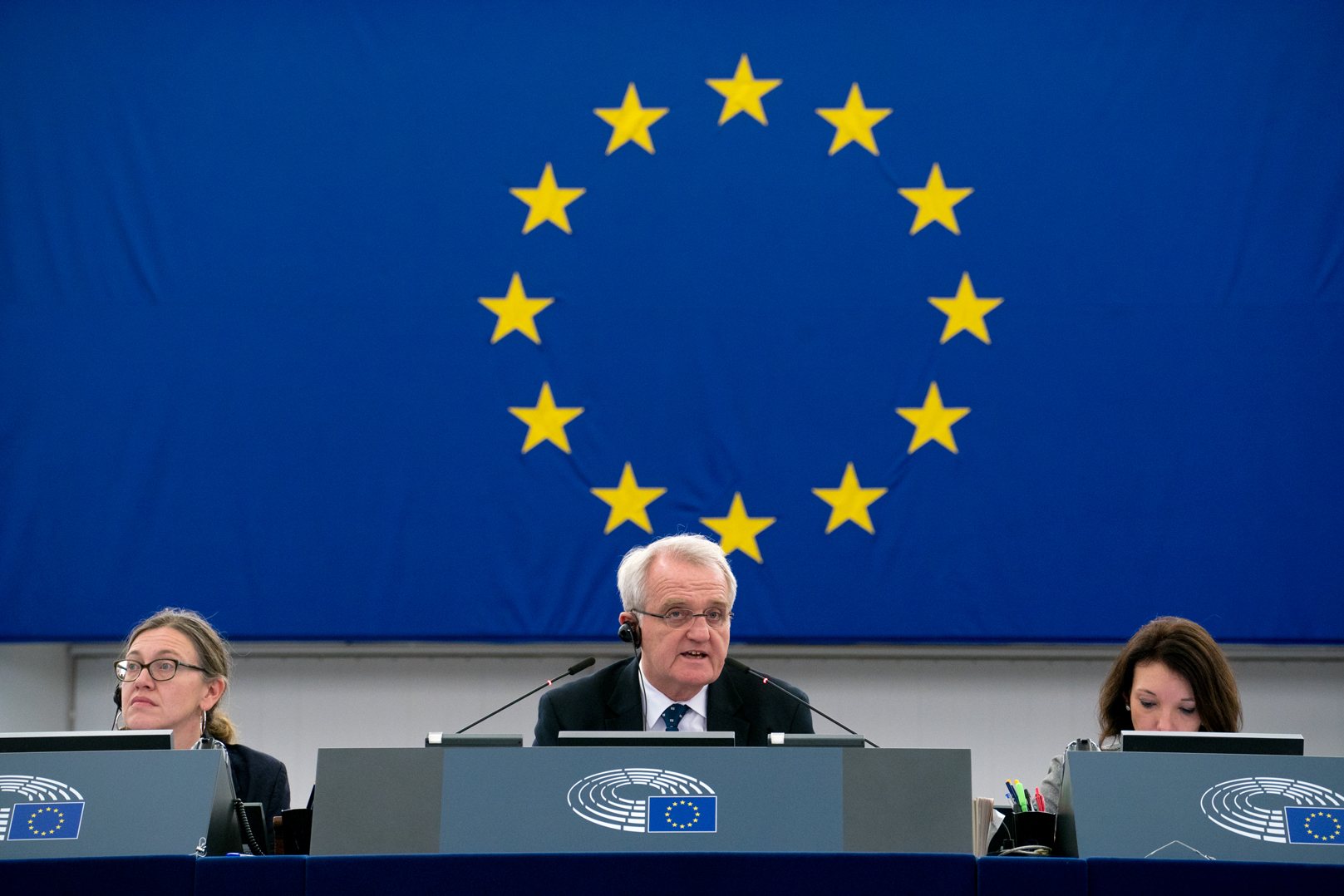2018 is looking to a be a big year for sustainability in the European Commission. The UN Sustainable Development Goals (SDGs) will come to the fore of political debate in Europe as the Commission presents its implementation strategy, under pressure from the European Council and European Parliament to take the Agenda 2030 seriously. We can expect concrete measures and mainstreaming of sustainability into EU policy.
On September 25th, 2015, a bold new global agenda to end poverty by 2030 and pursue a sustainable future was unanimously adopted by the 193 Member States of the United Nations at the start of a three-day Summit on Sustainable Development in UN Headquarters, New York City: the so-called the Global Agenda.
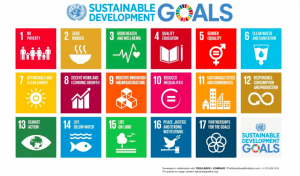
IN THE PHOTO: 17 SDGs. CREDIT: UN
Ushering in a new era of national action and international cooperation, the new agenda committed every country to take an array of actions that would not only address the root causes of poverty but would also increase economic growth and prosperity and meet people’s health, education and social needs, while protecting the environment. Speaking at the opening ceremony of the Summit, the United Nations Secretary-General Ban Ki-moon said:
The new agenda is a promise by leaders to all people everywhere. It is a universal, integrated and transformative vision for a better world.” It is an agenda for people, to end poverty in all its forms,” he added. “It is an agenda for shared prosperity, peace and partnership that conveys the urgency of climate action and is rooted in gender equality and respect for the rights of all. Above all, it pledges to leave no one behind.
“The true test of commitment to Agenda 2030 will be implementation. We need action from everyone, everywhere. Seventeen Sustainable Development Goals are our guide. They are a to-do list for people and planet, and a blueprint for success,” ended the Secretary-General.
The official adoption came shortly after Pope Francis addressed the General Assembly stating, “The adoption of the 2030 Agenda for Sustainable Development at the World Summit, which opens today, is an important sign of hope.”
During Rio de Janeiro’s Conference on Sustainable Development in 2012, the commitment among countries was on a global deal for sustainable development. A Resolution (A/RES/66/288) was released under the title “The Future We Want”. It was addressed having in mind what might be missing through the implementation of the Millennium Development Goals, announced by United Nations in 2005 and expected to be fulfilled by 2015.
The “most successful anti-poverty movement in history”, as UN referred to the Millennium Development Goals (MDGs), were in a way achieved, at least according to the information published by The Guardian. Some showed that poverty and mortality (including maternal mortality) were reduced, gender equality was 75 percent achieved in primary education in developing countries and access to water had considerably improved. On the contrary, the target of halting and beginning to reverse the spread of HIV/Aids by 2015 had not been met, though the number of new infections fell by around 40 percent between 2000 and 2013.
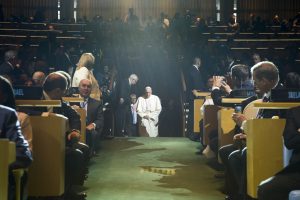
IN THE PHOTO: Pope Francis arrives in the General Assembly Hall to address the Assembly. CREDIT: UN Photo/Eskinder Debebe
SDGs are really gaining traction in the educational field, where many organizations like Teach SDGs, based in Florida (USA), which has a partnership with United Nations, are spreading the 17 goals into education, mainly thanks to the voluntary initiatives from many teachers-Ambassadors working together within this organisation all over the globe. “There is no higher curriculum than The Global Goals: Working on real-world problems is beyond engaging- it is a moral imperative. We like to brand ourselves as a movement more than an organisation, and we like to steer attention to the World’s Largest Lesson whenever possible. Over one thousand pledgers, over one hundred ambassadors, and more than 16000 followers” said Ada McKim, Member of TeachSDGs Board of Directors.
In the book “Teaching in the Fourth Industrial Revolution: Standing at the Precipice”, Koen Timmers, twice included in the Top-50 of the prestigious Global Teacher Prize award (top ten in 2018), focuses on how technology can be used in the classroom arguing that “formal education tends to be restricted to knowledge acquisition, memorisation and assessment”. While trying to break down classroom walls and making learning global, he decided to launch several student-centred projects focusing on one or more UN Sustainable Development Goals. His last project – Climate Action – involved 250 schools in over 69 countries in which students had to explore, brainstorm, discuss, present and share findings about Climate Change. Timmers advocates: “What’s better than learning about global issues directly from students living in those countries?”. The book is published by Routledge and is available on Amazon. For instance, at the EU level, the European Lifelong Learning Programme could be matched with the SDG4, as it calls for ensuring inclusive and equitable quality education and promoting lifelong learning opportunities.

IN THE PHOTO: Teaching in the Fourth Industrial Revolution: Standing at the Precipice 2018, by by Doucet A., Evers J., Guerra E., Lopez N., Soskil M., Timmers K., Routledge
On the other hand, in the private sector, the debate is now highlighting many businesses, industries and local authorities that are making efforts to shift their strategies to embrace sustainability. There are, however, several challenges associated with it. One of these is the interface between policy and business planning. Policy incoherence and policy shifts over time create major uncertainties for business leaders, boards and investors. In the energy sector, where policies have not worked out as expected (for example the EU Emissions Trading System price remaining much lower than originally planned), many changes are planned.
The European Commission’s Regulatory Scrutiny Board is looking at extending the EC’s environmental impact assessment to include broader sustainability criteria. These new indicators could measure impacts of EU on natural capital and social implications. In line with the focus on private sector commitments to environmental sustainability, we’ve seen a rise of “green bonds” — or financial investments – underwriting climate action projects. According to Ursula Woodburn, Account Director, Sustainability at Weber Shandwick, in the Climate Bonds Initiative, “about $81billion of green bonds were issued last year alone. The private sector has accelerated investments in similar bonds, including Apple and the International Finance Corporation, who recently invested $325 million in a green bond fund for projects in developing markets. And this is being encouraged at the highest political levels — as reflected by the G20 discussions on the work of the Financial Stability Board’s (FSB) Task Force on Climate-related Finance Disclosure (TCFD). Now, corporations are increasingly seeking to communicate their business goals and achievements consistently with the SDGs — both in sustainability reports and overall company and executive communication. Organisations such as Unilever and Ericsson have shared their vision for how they will work to achieve the ambitious agenda by 2030 — by targeting specific goals aligned to their business and forging new partnerships”.
But this is not the only domain where SDGs are set to be applied, as the EU is building a Circular Economy concept that aims at changing present consumption and production patterns, by focusing on design of products (durability, reparability, re-use and recyclability), waste (avoidance material recycling, energy recovery, avoidance of landfilling) and consumer awareness.
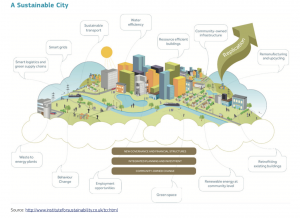
IN THE PHOTO: A sustainable city. CREDIT: Institute for Sustainability
These policies open substantial new employment opportunities and hence income for a wide variety of differently skilled workers. Transforming the growth model to foster innovation could also be an opportunity to reflect on the respective contribution of differently skilled forms of labour to our society. Moreover, digitalisation has boosted new collaborative models of the economy. The Commission has set a European agenda for the collaborative economy to provide guidance on how existing EU law should be applied to this dynamic and fast-evolving sector.
Other EU institutions have recently displayed increasing interest in SDGs. In fact, on May the 12th 2016, the European Parliament called on the Commission “to come forward with a proposal for an overarching Sustainable Development Strategy encompassing all relevant internal and external policy areas, with a detailed timeline up to 2030, a mid-term review and a specific procedure ensuring Parliament’s full involvement, including a concrete implementation plan coordinating the achievement of the 17 goals, 169 targets and 230 global indicators and ensuring consistency with, and delivery of, the Paris Agreement goals; and stressed the importance of the universality of the goals, and the fact that the EU and its Member States have made a commitment to implementing all the goals and targets fully, in practice and spirit”.
One step to respond to these expectations may be to endorse at the highest level the EU commitment to sustainability, as an immediate policy objective for the Union. A European Council Summit Declaration on sustainable development may be the appropriate tool. Appointing “Sustainability Ambassadors” and developing a “sustainability network” or a “vision network” within the Commission may be a practical means to breaking silos. It could be organised by themes, for instance, around individual SDGs, while keeping track of the overall picture.
There is another issue that proved to be of interest: International Trade and Climate Change. Trade Policy must contribute to reducing global inequalities, creating qualitatively different growth, bringing more inclusive social benefits while staying within the ecological limits of our planet. This may take the form of more sustainability certification schemes, fair trade labels. Besides, climate change is a top priority for a sustainable future.
For instance, oceans have a separate Sustainable Development Goal, SDG 14, due to their very substantive importance for the livelihood of millions of people in developing and developed economies. Ocean ecosystems are essential for oxygen production but are not in good shape. Apart from the problem of overfishing, oceans receive high levels of dangerous chemicals (nitrate and phosphorus) and plastic waste through river systems. In addition, climate change and acidification threaten biodiversity.
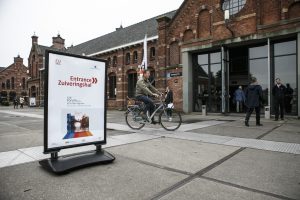
IN THE PHOTO: 30 May 2016, CoR Forum on the EU-Urban Agenda – Welcome & registration. CREDIT: European Union / Wim DaneelsDebeb
And what about us, the citizens? Well, the EU Urban Agenda, adopted in Amsterdam in June 2016, respects subsidiarity and puts the urban agenda among the priorities of the 2020 strategy for smart, sustainable and inclusive growth. It includes 12 Priority Themes and offers the possibility to cities to have easier access to funds for urban projects.
There are still some obstacles in the European Union bureaucracy that could have a negative impact on the implementation of SDGs. Hence, the European Commission, on an annual basis, launches a set of simplification initiatives within its Regulatory Fitness and Performance programme, also known as “REFIT” programme. Its aim is to keep European law simple, remove unnecessary burdens and adapt existing laws that may no longer be “fit for purpose” and, therefore, need to be adapted. Effectiveness, efficiency, simplicity and costs minimisation are all essential elements of the REFIT. The REFIT Programme is included in the preparation of the annual Commission work programmes, each of which includes proposals for new legislative initiatives and a review of existing EU laws. This is done through impact assessments, which means assessing the effects of EU laws by retrospective evaluations and stakeholder views, which are collected through consultations.
Simplification can be achieved through different means, and, in particular, changes can be made to existing law via:
- codification: all amendments made to a piece of legislation over the years are incorporated into a single new act, reducing volume and complexity;
- recasting: similar to codification, but in this case, the legislation itself is amended at the same time as previous amendments are incorporated to form one consolidated text;
- repeal: unnecessary and irrelevant laws are removed;
- review/sunset clauses: laws are reviewed or automatically removed after a given period
- revision: laws are modified to keep them up-to-date;
- replacement of directives with regulations, so that all EU citizens are subject to the same rules and national governments can’t add extra requirements;
- withdrawal of laws that have not yet been adopted if they become obsolete due to scientific or technical advances or if they are no longer in line with new policy objectives;
- replacement of legally binding laws with softer alternatives such as voluntary agreements (i.e. self-regulation, co-regulation).
As a conclusion, SDGs’ implementation in the European Union is far from being a reality. In fact, there are only three Member States that are setting sustainable development into their legislation. Will be 2018 a year of more adherence?
FEATURED PHOTO CREDIT: European Union 2017 – European Parliament via Flickr
Editors note: The opinions expressed here by Impakter.com columnists are their own, not those of Impakter.com


